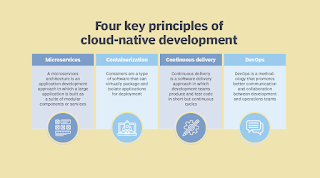Key capabilities of Cloud Native applications:
Microservices-based. Microservices break down an application into a series of independent services, or modules. Each service references its own data and supports a specific business goal. These modules communicate with one another via application program interfaces (APIs).
Container-based. Containers are a type of software that logically isolates the application enabling it to run independent of physical resources. Containers keep microservices from interfering with one another. They keep applications from consuming all the host's shared resources. They also enable multiple instances of the same service.
API-based. APIs connect microservices and containers while providing simplified maintenance and security. They enable microservices to communicate, acting as the glue between the loosely coupled services.
Dynamically orchestrated. Container orchestration tools are used to manage container lifecycles, which can become complex. Container orchestration tools handle resource management, load balancing, scheduling of restarts after an internal failure and provisioning and deploying containers onto server cluster nodes.











.gif)
0 Comments